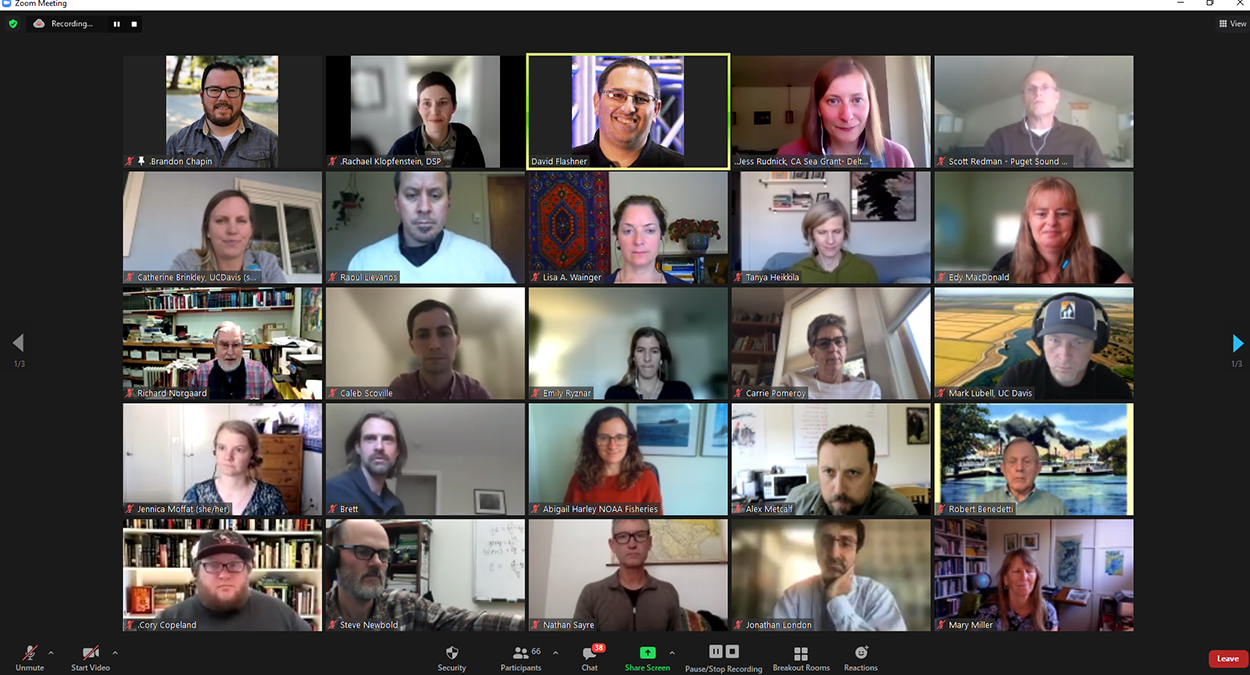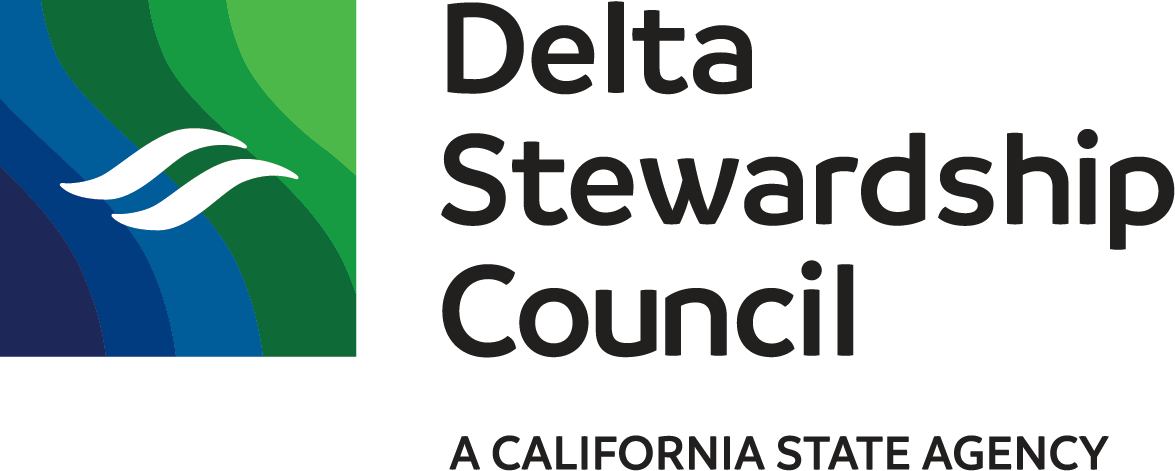Bay-Delta Social Science Community of Practice

Following recommendations from the Delta Social Science Task Force May 2020 report, A Social Science Strategy for the Sacramento-San Joaquin, the Delta Stewardship Council is helping to develop a more collaborative and integrated network of social scientists and practitioners across the San Francisco Bay and Sacramento-San Joaquin Delta system.
At the 2021 Bay-Delta Science Conference, hosted by the Council and U.S. Geological Survey, we launched the social science community of practice (CoP). The Council’s Social Science Integration Team produced a report to capture the key takeaways from the event, including who the CoP will involve and what social science activities and topics will be prioritized.
The purpose of the CoP is to bring together social science scholars, practitioners, and allies who are committed to advancing applicable and relevant research on the human dimensions of the Bay-Delta.
This community aims to:
- Facilitate collaborative social science research and interdisciplinary investigation,
- Provide opportunities for the social sciences to inform management and policy, and
- Advance our understandings of the estuary as a complex social-ecological system.
- Increase the body of social science research relevant to the region by conducting original data collection and investigation; developing and expanding conceptual frameworks linking the social and ecological dimensions of the estuary; and analyzing, reviewing, and synthesizing existing data and relevant comparative data
- Foster collaboration and co-production of social science by linking academia, agencies, tribes, non-governmental organizations, and communities across the region
- Communicate social science approaches, theories, tools, methods, and results to public, scientific, and governmental audiences to build literacy for the social sciences and understanding of the human dimensions of the region
- Inform management and policy with best available social science through frequent engagement and participation in decision-making venues across multiple scales in the region
- Provide mentorship and leadership opportunities for students and early career scholars and practitioners interested in working on the social sciences in this region
- Build the social capital needed to thoroughly integrate social sciences into a system that is heavily dominated by natural and biophysical scientific knowledge and approach, ultimately striving for a balanced social-ecological systems approach to management and policy
- Expand partnerships with other estuarine systems around the U.S. and internationally to learn, share and build improved understandings of social science integration and interdisciplinary science-based natural resource management decision-making
View the CoP’s Charter in PDF format.
- Diversity in network: recruit, attract, and support members from diverse backgrounds, career stages, geographies, disciplines, and institutions
- Equity, inclusion, and capacity building throughout all network activities: distribute opportunities for leadership, intellectual, and creative contributions between early, mid, and late-career members
- Boundary spanning: aim to build relevant, salient, and credible projects through co-production; foster collaboration on projects by engaging members from across academia, government, non-governmental organizations, and practitioners working in communities; prioritize accessibility in science communication and output products
CoP members are based in academia, government agencies, non-governmental organizations, and the private sector. Members opt-in to be included in our online CoP directory to facilitate easier connection and collaboration.
| Name (First Last) |
Affiliation (Organization, Department) |
Expertise/ Discipline | Areas of Focus | Links to professional platforms | |
|---|---|---|---|---|---|
| Abigail Harley | abigail.harley@noaa.gov | West Coast Regional Office NOAA Fisheries | Economics | Regulatory economics | https://www.fisheries.noaa.gov/about/west-coast-region |
| Adina Paytan | apaytan@ucsc.edu | UC Santa Cruz | Education | Biogeochemistry, climate, ecosystems, education | https://ims.ucsc.edu/ |
| Ajay Singh | Singh@csus.edu | California State University, Sacramento | Social psychology, behavioral economics, policy studies | Agriculture, water resources, climate change, endangered species | Singhsajay@gmail.com |
| Brett Milligan | bmilligan@ucdavis.edu | UC Davis | Landscape Architecture/Human Ecology | Landscape architecture, urban design, sustainable environmental planning | https://humanecology.ucdavis.edu/brett-milligan |
| Caleb Scoville | caleb.scoville@tufts.edu | Tufts University | Sociology, political science, political theory, economics | The politics of environmental knowledge, sociology of knowledge, sociology of science and technology, political sociology, social theory | http://calebscoville.com/; https://as.tufts.edu/sociology/people/faculty/caleb-scoville |
| Darcie Luce | darcie.luce@sfestuary.org | San Francisco Estuary Partnership | Anthropology | Environmental Anthropology | https://www.sfestuary.org |
| Don Hankins | dhankins@csuchico.edu | California State University, Chico | Geography, conservation, and environmental planning | Ecocultural equality, restoration, conservation, Indigenous stewardship, policy | @Pyrogeographer - Twitter handle; https://www.csuchico.edu/geop/department/dhankins.shtml |
| Dan Ray (Interim Executive Director) | dan.ray@delta.ca.gov | Delta Protection Commission | www.delta.ca.gov | ||
| Josue Medellin-Azuara | jmedellin-azuara@ucmerced.edu | UC Merced | Environmental Engineering | Hydro-economic modeling for management and policy, water management, agricultural production adaptation for climate change, sustainable agroecosystems, water informatics, impact analysis | @JosueMedellin - Twitter handle; https://engineering.ucmerced.edu/ |
| Kathleen Schaefer | kkschaefer@ucdavis.edu | UC Davis | @Q100lady - Twitter handle | ||
| Kelly Biedenweg | kelly.biedenweg@oregonstate.edu | Oregon State University | Human Dimensions of Fisheries and Wildlife | Conservation psychology and human wellbeing, human dimensions of natural resource management, program evaluation and facilitation, environmental education, social learning | kellybiedenweg.weebly.com; https://fwcs.oregonstate.edu/users/kelly-biedenweg |
| Lindsay Correa | lindsay.correa@water.ca.gov | California Department of Water Resources | Regional climate change | Environmental policy and management | https://water.ca.gov/Programs/All-Programs/Climate-Change-Program |
| Mark Lubell | mnlubell@ucdavis.edu | UC Davis | Political Science, Environmental Science | Governance, water management, sustainable agriculture, adaptive decision-making, climate change and local government policy, transportation behavior, plant disease management and invasive species, social network analysis | @envpolicycenter - Twitter handle; https://environmentalpolicy.ucdavis.edu/ |
| Mark Nelitz | mnelitz@essa.com | ESSA Technologies Ltd | Adaptive Management | Adaptive management, human dimension surveys, conceptual modelling, behavior models, decision theory | https://www.linkedin.com/in/marc-nelitz-347776b6/; http://www.essa.com/ |
| Megan Wheeler | meganw@sfei.org | San Francisco Estuary Institute | Resilient landscapes | urban ecology, social-ecological systems | |
| Mike Antos | mike.antos@stantec.com | Stantec and UCI Anthropology | Geography, Civic Ethnography | Environmental governance, transition management, integrated water management, climate adaptation | www.linkedin.com/in/mantos |
| Pam Rittelmeyer | pamrittel@gmail.com | UC Santa Cruz | Human geography, environmental policy | Climate change adaptation, risk perceptions | pamrittel@gmail.com |
| Philip Garone | pgarone@csustan.edu | Stanislaus State | History | Environmental history and ecology, global climate change and history | https://www.csustan.edu/history/Garone; pg.envhist@gmail.com |
| Robert Benedetti | rbenedetti@pacific.edu | University of the Pacific | Political Science | ||
| Rosemary Kosaka | rosemary.kosaka@noaa.gov | NOAA Southwest Fisheries Science Center | Fisheries Ecology | Economics | https://www.fisheries.noaa.gov/about/fisheries-ecology-division-southwest-fisheries-science-center |
| Steve Newbold | snewbold@uwyo.edu | University of Wyoming | Economics | Environmental economics, natural resource economics, econometrics, ecological modeling | http://www.uwyo.edu/economics/faculty-staff/stephen-newbold/index.html |
| Tanya Heikkila | tanya.heikkila@ucdenver.edu | University of Colorado, Denver | Public policy, institutional analysis, environmental governance | Collaborative governance, environmental conflict, water governance, energy politics | @tanyaheikkila - Twitter handle; https://publicaffairs.ucdenver.edu/people/faculty/tanya-heikkila |
| William Swagerty | wswagerty@pacific.edu | University of the Pacific | History, archaeology, anthropology | History of agriculture, transportation and communication on the California Delta |
For more information or interested in joining the CoP, email Tara Pozzi at tpozzi@ucsd.edu.
Community of Practice members meet quarterly. To join these meetings, please email Beck Barger at Beck.Barger@deltacouncil.ca.gov.
Learn about other social science-related events on the Council on the social science web page.
Advancing Interdisciplinary Research | 2022
This two-part event included a training and workshop on interdisciplinary research in the Sacramento-San Joaquin Delta. The event aimed to (1) share knowledge across the social and natural science communities, (2) provide examples of interdisciplinary research that could advance useable science in the Delta, and (3) overcome barriers to interdisciplinary research by spurring new relationships and exploring innovative solutions to the Delta’s entrenched challenges. Training and workshop attendees were a diverse audience of over 80 participants from agencies and academia.
- Event Summary
- Agenda
- Training Recording
- Workshop Recording
- List of Delta groups and forums where collaboration occurs across entities, disciplines, and topics.
Human Dimensions research in Delta Environments Workshop | 2019
This workshop showcased how social science research addresses management challenges faced by the Delta Stewardship Council, stakeholders, and more. Workshop materials available online.
Learn about specific Council projects on the social science web page.
- HD.gov: USGS’ federal effort to integrate human dimensions into natural resource work across federal agencies
- MarineSocSci: A network linking organizations and individuals integrating social sciences into marine and coastal natural resource management
- Wondering what is a “community of practice”? Read this information sheet by Mississippi-Alabama Sea Grant and the National Oceanic and Atmospheric Administration
- Training
- Case Studies
- NOAA Social Coast Forum presentations (2022)
- Edy McDonald presentation in CA Dept. of Fish & Wildlife Conservation Lecture Series with examples of behavioral science informing conservation efforts in New Zealand (2019)
- Social Science in the Delta
- The Council’s Social Science Task Force Report (2020)
- Delta Independent Science Board’s Review of Research on the Sacramento-San Joaquin Delta as an Evolving Place (2017)
- Lubell et al. (2022) Governing Science: Learning and Adaptive Management in the California Delta. Pre-print available at https://dx.doi.org/10.2139/ssrn.4175099
To learn more about the CoP or to get involved, please contact Tara Pozzi at tpozzi@ucsd.edu.

